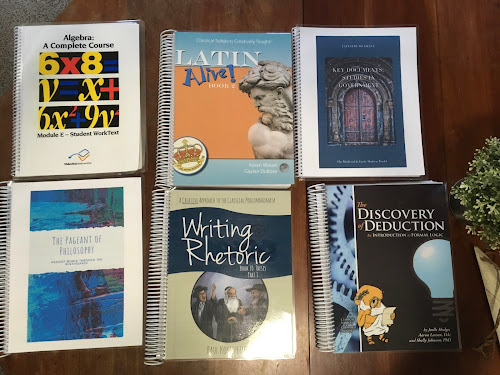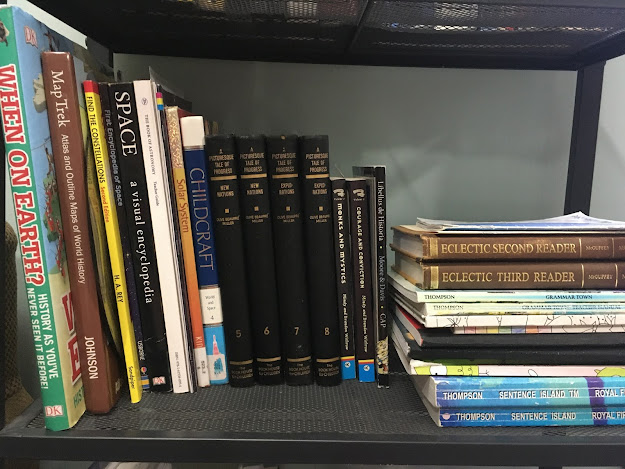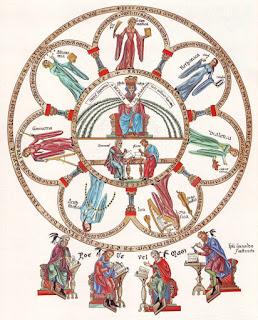As we're only two weeks from our start to school year, it's time for my Spero Academy Curriculum Picks post for 2020-2021! I really, really love planning for our studies! :)
Upper School: Luke and Kiryn are 13 and 15. They are doing the exact same courses this year, which will count for full high school credits for Luke as a freshman, and maybe also for Kiryn. I don't know that I want her graduating a year early, but it might be an option depending on what her immediate plans are.
I've tried really hard to reach for multum, non multa: much, not many. I want us to go deep and read rich things. I want there to be time to live fully too. So for the next four years through high school credits, we are focusing on the liberal arts. So our categories of studies are:
-Mathematics
-Natural Sciences
-Great Books
-Latin
-Logic-->Rhetoric
-Music
So here's our picks!
I wrote in my reviews for last year all about the major mathematical reasoning gaps we discovered. I've always wanted to have the kids learn all of algebra before moving on to geometry. When we figured out we needed to start back at the beginning of Algebra, VideoText was clearly the winner. My major fail was that I wasn't inspecting well enough the work they were doing. Also, another issue is that Luke was doing geometry while Kiryn was doing Algebra 1. It was difficult for me to keep up with both separately.
When I realized we had some major holes to plug, I opted for VideoText for a lot of reasons. First, we can feasibly get through the entire thing this coming school year, which will provide Luke and Kiryn with a credit in Algebra 2. We will sit down and go through the lessons together each day, and immediately check their work. We tested it out this spring, and the lessons took about 30 minutes on average start to finish. I can handle that amount of time, especially considering it included the grading! On top of that, the kids said, "I can see why we need to do this." They realized how much they weren't actually understanding.
Provided the rest of the course goes like the first unit, we'll likely continue with VideoText Geometry, which will give the kids full high school credits in geometry, trig and precalculus.
High school science is going to be my biggest challenge, and I'm just not fully ready to take on lab sciences yet. Since we are studying medieval times this year, and since as a liberal arts educator, astronomy is absolutely necessary for my kids, we are going to do astronomy this coming year before moving into upper lab sciences. Signs & Seasons will help the kids learn to follow the seasonal cycles of the celestial bodies, and to find the bright visible planets in the night sky.
Signs & Seasons is classical astronomy and exactly what I'd like them to have. The book is a fairly short read, so we'll read it pretty quickly and spend the rest of the year doing observation activities. The observations actually *do* count for a full science lab, and they're the kind of labs I can get behind: stargazing! In addition to this, we're going to read selections from Joy Hakim's The Story of Science, (Aristotle Leads the Way, and Newton at the Center). They're great books that cover the history of science and I hope will be good additions to our study of astronomy. I'm really looking forward to this last year before we get into things like physics and biology.
We're strongly continuing on with Latin Alive! We loved it last year and I'm looking forward to stretching our vocabulary and reading skills!
This has been my biggest summer project. I knew nothing about logic and figured I needed to go through the whole thing myself. I'm about halfway through, so I'm in good shape. I've been working through the class on ClassicalU, and reading Socratic Logic by Peter Kreeft. I'm so excited about this study! Discovery of Deduction is Aristotelian, language based logic. I'm really looking forward to the brain training the kids are going to get, and me too! At the end of the year, they'll do a capstone project of identifying the logical argument presented by C. S. Lewis in Mere Christianity.
Continuing on with Writing & Rhetoric. This book is going to stretch the kids really well. The final essay in the book is entitled, "What is Beauty?" The book provides lots of readings exploring the idea of beauty that the kids will have to assimilate and use as evidence to support their thesis. They also be learning some new rhetorical devices and practicing more in using the five common topics of invention they learned last year.
-Music: Orchestra and (hopefully) Choir at the public school like the past four years. Luke is still loving the cello, Kiryn is still playing the viola.
-Great Books: Christendom (early church through Reformation)
I'm so excited about this! Our Great Books this year is going to encompass:
-history
-government
-philosophy
-art history
-literature
I was going to do Church History instead of art history or government, but our church youth group decided to use my church history curriculum this summer! So the kids have already gone through it there! Bonus! We would have used
Christian History Made Easy by Timothy Paul Jones. This may seem like a lot still, but each of these individual tracks are very light. There are 24 history lessons, 18 government lessons, 16 philosophy lessons, and 12 art history lessons. So they won't be reading all four of these each week. It will be on a rotation. And the readings individually are fairly short and easily manageable.
 |
| The Freshman book shelf |
For History:
-
Oxford University Press The European World and Age of Voyages, with student and teacher guides: These look awesome. The text is really well-laid out and enjoyable, with great pictures and graphics. It includes some source-text readings as well. The student workbook offers lots of thinking and working with the concepts. The kids will learn how to use a variety of graphic organizers, cause and effect, points of view, sequencing, write various types of descriptive and persuasive essays based on the topics in the chapter, and do various mapping activities. The teacher's manual has more options for groups as well as discussion questions to lead the kids in a conversation about the chapter topics. It looks excellent and I think my kids are really going to enjoy all the various ways to engage with the reading, and doing less history reading than we've done ever. I wanted a more analytical approach to history this year, and this is going to provide it.
For government, we are using
Tapestry of Grace's rhetoric government track. I love Tapestry of Grace, but it is too much for us right now as a whole. But their government track is great! There are about 18 lessons over our time period. The kids will read source text readings from Justinian's Code, Alfred's Book of Dooms, Islamic Law, Machiavelli's The Prince, Luther, Copernicus, Calvin, and more. Tapestry provides some thinking questions for the students and a discussion script for me as a teacher. There are also some readings from The Theme is Freedom by Evans and On the Medieval Origin of the Modern State by Strayer.
For Philosophy, we're also using
Tapestry of Grace. They have written Pageant of Philosophy into their week plans. Pageant is a dialogue between Simplicio and various philosophers through time. It introduces the student to the ideas of each philosopher in a summarized way, and also provides a discussion script for the teacher. There are some context readings in The DK Philosophy Book. We started this track last year in the ancients and my kids really enjoyed it. The readings are light and the questions lead to great discussion.
For art history, we're using a living book:
A History of Art for Young People. I picked this up at a used bookstore and it is lovely with succinct information on time periods and beautiful photos of significant works from each period. I've chunked up the readings and will assign them to correlate with their history as best I can. I also will print poster sizes of some of the art and hang them up around the house so they're filling up our environment this year.
For literature, we're doing an online class with
Spero Virtual Schole! I'm co-teaching this and it will operate like a flipped classroom. The kids will read:
- The Book of Pastoral Rule by Gregory the Great
- Beowulf
- History of the Kings of England by Monmouth
- The Canterbury Tales (selections) by Chaucer
- The Divine Comedy by Dante Alighieri
- The Faerie Queene by Edmund Spenser
- Selections from Reformation writers
- The Golden Legend
- Foxe’s Book of Martyrs
The really great thing about this class is that as long as the students read these titles, they can use any curriculum they like. We are going to use Brit Lit by Logos Press, the first three volumes plus the Poetry Workbook for the main titles (Beowulf, Monmouth, Chaucer, Spenser). Brit Lit also schedules The Hobbit alongside Beowulf, and That Hideous Strength alongside Monmouth. I love the simplicity of the Brit Lit program. The readers are really lovely and have conversation style questions written in. I love the inclusion of the Poetry Workbook, as the kids will learn to write Anglo-Saxon kennings, Shakespearean sonnets, and more. We'll spend about a month on each of these titles, two on Dante, and take all of December off. The kids will meet once a week for discussions, to share recitations or writings, to learn Close Reading skills, and to learn the historical context and author background of the works. I'm so looking forward to this year! We have an extra few books that if we have time, I will work into our reading. I'd LOVE for the kids to read Augustine's Confessions, The Rule of St. Benedict, some Consolation of Philosophy by Boethius and some Luther and Calvin. But I'm going to see how the year goes before expecting that just yet.
 |
| Some of the books on stand-by |
So that's it for my Upper School kids!
For my Lower School kids, Levi will be in 5th and Meryn will be in 4th. Holy cow. How did that happen???
I'm trying to keep them fairly simple too, by focusing on four main things:
-language
-books
-math
-music
For Language
Levi will do
-Grammar Voyage for grammar, Paragraph Town, and Music of the Hemispheres
-Writing & Rhetoric Books 3-4
-Latin for Children Primer B
-Reasoning & Reading Book 1
-All About Spelling Level 5
-McGuffey Reader 3-4
Meryn will do:
-Grammar Voyage for grammar, Paragraph Town, and Music of the Hemispheres
-Writing & Rhetoric Books 1-2
-Latin for Children Primer A
-All About Spelling Level 4
-McGuffey Reader 2-3
Grades 4-6 are our super language intensive years, so if this looks like a lot, it kind of is. :). We do it on purpose.
For Math:
Levi will continue with MUS in Epsilon.
Meryn will continue with MUS in Delta.
For music, the kids will keep doing piano lessons.
Upper Elementary Read Aloud for history, science, geography and grammar
For books, we're going to study the same time period as the older kids, Christendom. We're going to read Vol. 5-8 of A Picturesque Tale of Progress (we read Vol. 1-4 this past year). Here's a list of other books we'll read together! I'll also have the kids do some mapping activities with MapTrek and Drawing through History. We're going to as a family make time each week for journaling, so that will also be a part of their history studies next year. I bought everyone neat bullet journals so they can get as creative as they want to.
Lower School History | Lower School Literature |
A Picturesque Tale of Progress vol. 5-8 | Arabian Nights |
Castle by Macaulay | The Story of King Arthur by Pyle |
Cathedral by Macaulay | Beorn the Proud |
Leif the Lucky by D’Aulaire | Otto of the Silver Hand by Pyle |
Usborne Medieval World | Crispin by Avi |
Living History: Knights in Armor | Augustine Came to Kent by Willard |
Famous Men of the Middle Ages | The Adventures of Robin Hood by Green |
Famous Men of the Renaissance | Adam of the Road |
Good Queen Bess by Stanley | The Vikings by Janeway |
The Genius of Leonardo by Visconti | Tales from Shakespeare by Lamb |
Lady Jane Grey by Carr | Independent Reads: |
Marco Polo by Roth | The Door in the Wall |
William of Orange - The Silent Prince by Van de Hulst | The Sword in the Tree |
Will Shakespeare and the Globe Theater by White | The Reluctant Dragon |
Huguenot Garden | Leif Ericson Explorer |
Various titles by Vernon on Reformation | Pedro’s Journal |
Levi's ten, and he's been a little slow to take to independent reading. He's able, just uninterested or easily distracted. He has a hard time finishing a book before starting another one. The past few years I've relished my reading aloud to kids on the couch, so I've pretty much read everything to him and Meryn together. This year though, I realize he needs to start reading for his own learning. So I'm assigning at least the five books listed above as independent reading. These are all in Tapestry of Grace Upper Grammar, so I'll have him complete the student worksheets from Tapestry after he reads them. If it goes well, I'll have him keep going in Tapestry Upper Grammar Literature.
 |
Upper Elementary literature shelf
|
 |
| Upper Elementary History Shelf |
As part of our books study, we're going to do Memoria Press Astronomy and read The Storyland of the Stars, since big brother and big sister will be learning the stars. We'll all enjoy doing some stargazing together!
That sums it up. I think it's going to be a great year!








Comments
Post a Comment